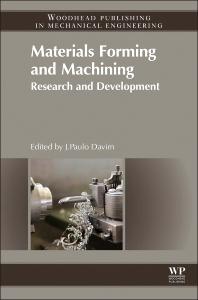
“Materials Forming and Machining: Research and Development” from Elsevier Inc.’s Woodhead Publishing imprint publishes refereed, high-quality articles with a special emphasis on R&D in forming materials, machining and its applications. A large family of manufacturing processes are now involved in material formation, with plastic deformation and other techniques commonly used to change the shape of a workpiece.
Materials forming techniques discussed in the book, which is edited by J. Paulo Davim, include extrusion, forging, rolling, drawing, sheet metal forming, microforming, hydroforming, thermoforming and incremental forming, among others. In addition, traditional machining, nontraditional machining, abrasive machining, hard-part machining, high-speed machining, high-efficiency machining and micromachining are also explored, proving that forming technologies and machining can be applied to a variety of materials.
This seven-chapter book is aimed at undergraduates in engineering courses, for example, mechanical engineering, manufacturing, industrial and materials. The book is also aimed at academics, manufacturing researchers and other professionals in related industries with materials forming and machining.
Contact Details
Related Glossary Terms
- abrasive
abrasive
Substance used for grinding, honing, lapping, superfinishing and polishing. Examples include garnet, emery, corundum, silicon carbide, cubic boron nitride and diamond in various grit sizes.
- abrasive machining
abrasive machining
Various grinding, honing, lapping and polishing operations that utilize abrasive particles to impart new shapes, improve finishes and part stock by removing metal or other material.
- extrusion
extrusion
Conversion of an ingot or billet into lengths of uniform cross section by forcing metal to flow plastically through a die orifice.
- nontraditional machining
nontraditional machining
Variety of chemical, electrical, mechanical and thermal processes for machining workpieces. Originally applied to new or emerging processes, it designates any process developed since 1945.
- plastic deformation
plastic deformation
Permanent (inelastic) distortion of metals under applied stresses that strain the material beyond its elastic limit.
